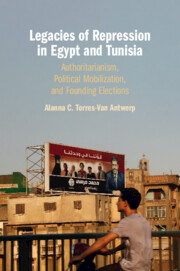 Legacies of Repression in Egypt and Tunisia
Legacies of Repression in Egypt and Tunisia Book contents
- Legacies of Repression in Egypt and Tunisia
- Legacies of Repression in Egypt and Tunisia
- Copyright page
- Dedication
- Contents
- Figures
- Tables
- Acknowledgments
- Introduction
- 1 Authoritarian Politics and Founding Elections
- Part I Members of the Club or the Only Game in Town?
- Part II Phoenix from the Ashes
- 4 Linking the Authoritarian Landscape to Party Formation and Political Mobilization in Egypt’s Founding Elections (2011)
- 5 Party Formation and Political Mobilization in Comparative Perspective
- Part III Epilogue
- Appendix
- References
- Index
4 - Linking the Authoritarian Landscape to Party Formation and Political Mobilization in Egypt’s Founding Elections (2011)
from Part II - Phoenix from the Ashes
Published online by Cambridge University Press: 10 March 2022
- Legacies of Repression in Egypt and Tunisia
- Legacies of Repression in Egypt and Tunisia
- Copyright page
- Dedication
- Contents
- Figures
- Tables
- Acknowledgments
- Introduction
- 1 Authoritarian Politics and Founding Elections
- Part I Members of the Club or the Only Game in Town?
- Part II Phoenix from the Ashes
- 4 Linking the Authoritarian Landscape to Party Formation and Political Mobilization in Egypt’s Founding Elections (2011)
- 5 Party Formation and Political Mobilization in Comparative Perspective
- Part III Epilogue
- Appendix
- References
- Index
Summary
Chapter 4 begins with an in-depth process tracing of the decisions around political party formation in Egypt after Mubarak’s ouster. We revisit the puzzling variation in party formation across the Egyptian political opposition landscape, particularly examining the decision on the part of Egyptian organized labor and pro-reform activist groups not to form political parties, tracing the link between the structure of the opposition under the Mubarak regime to the strategic incentives and organizational constraints faced by groups at this juncture. We then conduct an in-depth within-case comparison of the mobilization prior to Egypt’s 2011 elections, utilizing granular data on political parties’ specific campaign strategies and methods to trace the link between the adaptations that various groups made during the Mubarak era to the relative organizational and persuasive resources political groups had, and the mobilization tactics and strategies they were then able to use. We also specifically examine compelling evidence for common alternatives or contributing explanations for the Muslim Brotherhood’s success, and show that while these explanations certainly fill in part of the picture, they are incomplete without an understanding of mechanisms linking authoritarian legacies to the 2011 elections.
Keywords
- Type
- Chapter
- Information
- Legacies of Repression in Egypt and TunisiaAuthoritarianism, Political Mobilization, and Founding Elections, pp. 129 - 173Publisher: Cambridge University PressPrint publication year: 2022


